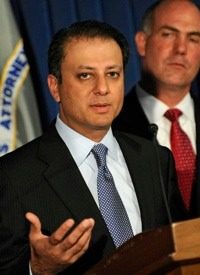
Those arrested were part of a larger crime ring reportedly intending to supply Stinger Missiles, AK-47 automatic rifles, and U.S. carbines to terrorist groups such as the Taliban and Hezbollah.
The Blaze reports, "At least two of the men arrested, Lebanese national Bachar Wehbe and Afghan national Tazar Gul Alizai, are currently on U.S. soil and are reportedly set to appear before a federal court in Manhattan."
Alizai allegedly belongs to the Taliban, and was caught selling assault rifles and a large amount of heroin to an undercover agent of the Drug Enforcement Administration in Kandahar, Afghanistan. Wehbe is a member of Hezbollah, and along with two other Hezbollah agents — Siavosh Henareh and Cetin Asku — he reportedly planned to use the proceeds from the sale of the heroin to purchase surface-to-air missiles, AK-47 rifles, and M-4 rifles.
Henareh reportedly had participated in a series of meetings with DEA confidential sources in Turkey, Romania, and Greece that began in June 2010. During those meetings, Henareh reportedly agreed that he would import hundreds of kilograms of high-quality heroin into the United States and that the profits would be used to purchase weapons for Hezbollah.
Those same undercover sources were then introduced to Aksu and Wehbe, and in February 2011 Aksu and Wehbe agreed to purchase military-style weapons from confidential DEA sources for Hezbollah. A contract was signed by Aksu and Webhe on June 13, 2011 for $9 million in weapons.
According to TickletheWire.com:
Henareh and Aksu were arrested Monday in Bucharest, Romania, where they were detained pending extradition to the United States, authorities said. Wehbe and Gul were arrested Monday in the Republic of the Maldives, and arrived in the Southern District of New York earlier Tuesday.
U.S. Attorney Preet Bharara explains,
Today’s indictments provide fresh evidence of what many of us have been seeing for some time: the growing nexus between drug trafficking and terrorism, a nexus that threatens to become a clear and present danger to our national security.
Combating this lethal threat requires a bold and proactive approach. And as crime increasingly goes global, and national security threats remain global, the long arm of the law has to get even longer.
ABC News notes that these arrests are the “third and fourth of its kind recently conducted by the DEA, including the case of international arms broker Victor Bout.” Dubbed the “Merchant of Death,” Bout was arrested in 2008 on charges that he conspired to kill U.S. nationals, U.S. officers, and employees; conspiracy to acquire and use an anti-aircraft missile; and conspiracy to provide material support to a terrorist organization.
The operations are part of a larger sting operation conducted by the Drug Enforcement Administration that The Blaze credits with “making it possible for federal prosecutors to tie in arms dealing cases that might have otherwise escaped U.S. jurisdiction.”
In 2009, Rachel Ehrenfeld, director for the American Center for Democracy and the New York City Center for the Study of Corruption and the Rule of Law, wrote in Forbes of the link between narcotics and terrorism, noting:
To win, the link between narcotics and terrorism must be severed. That is the necessary condition for a successful strategy to undermine the growing influence of al-Qaida, the Taliban and radical Muslim groups in Afghanistan and Pakistan.
It is all about money — more precisely, drug money. The huge revenues from the heroin trade fill the coffers of the terrorists and thwart any attempt to stabilize the region.
After Afghanistan was freed from Taliban rule, its opium production increased dramatically, from 640 tons in 2001 to 8,200 tons in 2007. It now supplies over 93 percent of the global opiate market, wrote Ehrenfeld.
"This is a source of income for the warlords and regional factions to pay their soldiers," warned former Afghan Interior Minister Ali Ahmad Jalili in a May 2005 interview with Reuters. "The terrorists are funding their operations through illicit drug trade, so they are all interlinked."
Ehrenfeld explained further:
The exponential growth in narcoterrorism in Afghanistan led to a well-entrenched narco-economy, strengthening the power of tribal warlords, the Taliban and al-Qaida. The growing violence led NATO leaders, who met in Budapest in October 2008, to agree to allow their military forces to strike the drug traffickers. However, NATO troops were not ordered to attack; in fact, NATO’s European allies are "averse" to drug eradication programs for fear of alienating the local population and because of the risks associated with such operations.
Ehrenfeld proposed a solution to prevent this alienation:
The Obama administration should implement an innovative and safe poppy eradication method that previous U.S. governments spent billions of dollars developing. Mycoherbicides are naturally occurring fungi that are used to control such illicit pest plants as the opium poppy and other noxious weeds. Unlike chemical controls now in use, mycoherbicides assail only the targeted plant, rendering its cultivation uneconomical. These fungi continue to live in the soil, preventing the future growth of the opium poppy plant, but are harmless to other crops, to humans and to the environment.
Instead, however, the Obama administration elected to stop crop destruction and rest upon the efforts of the Drug Enforcement Administration. Iron Mountain Daily News reported in 2010:
The Obama administration has shifted away from crop destruction, believing it alienates Afghan farmers and pushes them into the hands of the Taliban. The Washington Post reported recently that the Drug Enforcement Administration has 96 agents in Afghanistan. Seizures of drug shipments and arrests of drug lords are on the rise.
For this fall’s planting season, the administration plans to expand a crop substitution program by sending more agricultural and development specialists into Helmand Province, the heart of the poppy region.
Afghanistan continues to be the largest producer of heroin, which is undeniably helping to fund terrorist organizations.
Photo of U.S. Attorney Preet Bharara: AP Images




